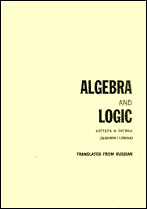|
This article is cited in 5 scientific papers (total in 5 papers)
Dynamic mereotopology. III. Whiteheadian type of integrated point-free theories of space and time. III
D. Vakarelov
Sofia University, Faculty of mathematics and informatics, Department of mathematical logic and applications, Blvd James Bourchier 5, Sofia, Bulgaria
Abstract:
This is the third in a three-part series of papers shortly denoted by Part I [Algebra i Logika, 53, No. 3 (2014), 300–322], Part II [Algebra i Logika, 55, No. 1 (2016), 14–36], and Part III. The papers mentioned are devoted to some Whiteheadean theories of space and time. Part I contains a historical introduction and some facts from static mereotopology. Part II introduces a point-based definition of a dynamic model of space and the definition of a standard dynamic contact algebra based on the so-called snapshot construction. The given model has an explicit time structure with an explicit set of time points equipped with a before-after relation and a set of regions changing in time, called dynamic regions. The dynamic model of space contains several definable spatio-temporal relations between dynamic regions: space contact, time contact, precedence, and some others. In Part II, a number of statements for these relations are proven, which in the present Part III are taken as axioms for the abstract definition of some natural classes of dynamic contact algebras, considered as an algebraic formalization of dynamic mereotopology. Part III deals with a representation theory for dynamic contact algebras, and the main theorem says that each dynamic contact algebra in some natural class is representable as a standard dynamic contact algebra in the same class.
Keywords:
dynamic contact algebra, dynamic mereotopology, point-free theory of space and time, representation theorems.
Received: 01.11.2013
Citation:
D. Vakarelov, “Dynamic mereotopology. III. Whiteheadian type of integrated point-free theories of space and time. III”, Algebra Logika, 55:3 (2016), 273–299; Algebra and Logic, 55:3 (2016), 181–197
Linking options:
https://www.mathnet.ru/eng/al742 https://www.mathnet.ru/eng/al/v55/i3/p273
|


| Statistics & downloads: |
| Abstract page: | 257 | | Full-text PDF : | 57 | | References: | 43 | | First page: | 5 |
|





 Contact us:
Contact us: Terms of Use
Terms of Use
 Registration to the website
Registration to the website Logotypes
Logotypes







 Citation in format
Citation in format 
